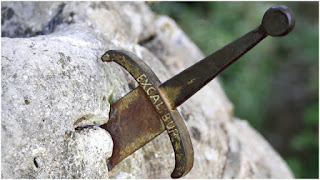What Makes Magic Items Interesting
THE QUESTION HATH BEEN RAISED! The answer shall be found. Hopefully.
As anyone familiar with my blogging, my tweets, or my videos will know: I am mostly an amalgamation of a ton of incomplete thoughts. Occasionally, those thoughts find something that makes sense, then they spit it out for others to see it and revise as needed. Here's what I've got for magic items right now.
1. Risk vs. Reward
This should be no surprise, especially to fans of old school gaming. One of the things that really lights our fire for gaming is the desire to have to make difficult choices, and to see the ramifications of those choices. This is the essence of role-playing (as opposed to telling a story/acting). Here's your situation, what do you do? Magic items have the capacity to introduce risk vs. reward in two ways. Earning the magic item can be an exercise in risk vs. reward, and using the magic item can be an exercise in risk vs. reward.
Perhaps the characters are delving into the tombs of a long dead and despised pharaoh. Buried with his riches by a populace terrified of his curse, the architect of the crypt who knew how to avoid the traps is long dead kind of thing. Perhaps the riches are the goal or the vanquishing of the ancient evil stirring within. But the group sees an all-too-easily accessed jeweled scimitar in the hands of a stone statue beside the pharaoh's sarcophagus. Perhaps a historian could reveal that the statue is of the pharaoh's sworn guardian who was thought to be immortal. Immediately, the players are going to think "that thing is probably a trap. Maybe it awakens all of the stone statues in this place and we're going to be overwhelmed. Maybe there's some horrific curse on it. Either way, we might be fucked if we grab this thing. Or we might have a powerful weapon."
That dilemma is an interesting component that is introduced that's not unlike the pulling of a mysterious lever, but with the added potential for more shenanigans. A benefit that they can take with them that's sitting right in front of them, daring to be utilized.
Let's say they decide to take it. Do they grab it bare handed, or do they handle it in layers of cloth to avoid direct touch? Do they can either identify it or pay some poor mook to handle it for them and see what happens?
Let's say they just grab the thing. The wielder now has a +2 magic sword with a hatred for traitors that allows it to sap the life right out of them (2d4 HP drain, let's say), but has a temporary curse that fills the wielder with the will of the guardian. The guardian demands that the intruders surrender their earnings and leave the tomb. The wielder must pass a Save vs. Magic or be taken over for 10 minutes, at which point, the wielder will attack anyone holding a belonging of the pharaoh's. They repeat the saving throw every ten minutes, and after 24 hours, the curse goes away.
The players don't know how long this will last. All they know is that their friend is compromised and is threatening to kill them if they don't hand over the goods and leave. This adds even more uncertainty. Should they kill the wielder? Should they cast Sleep on them and bind them up? Will they have to get this curse lifted by a Cleric or through some kind of purification ritual? Uncertainty raises tension. At the end of the day, the players end up with a powerful magic weapon that has personality and a history. That's cool.



Good commentary, thank you. Been thinking about magic/cursed items a bunch lately so seeing someone else's thoughts on the subject is helpful.
ReplyDeleteIn addition to your split of magic items' risk vs. reward in getting them or in using them, I think there's a meaningfully distinct category of magic items that can transform a type of risk into another type, or a type of reward into another type, particularly in OSR play where there are these multiple vital resources you have to manage (light, rations, time, HP, etc.).
Something like a wishing well that produces a water elemental servant based on the coins you toss in (with more coins making a bigger/longer-lasting servant), or like some "oil of courage" you can put in a torch/lantern to instantly burn it out but allow hirelings to reroll a failed morale test, or whatever.
Hell yeah.. I love both of those ideas.
DeleteI always turn to Vampire any time I want to. I became a Vampire because of how people treat me, this world is a wicked world and not fair to anybody. at the snack of my finger things are made happen. I am now a Powerful Man and no one steps on me without an apology. I turn to Human beings also at any time I want to. and am one of the most dreaded Man in my Town. I became a Vampire through the help of my friend who introduced me into a Vampire Kingdom by giving me their email. if you want to become a Powerful Vampire kindly contact the Vampire Kingdom on their Email: Vampirelord7878@gmail.com
ReplyDelete